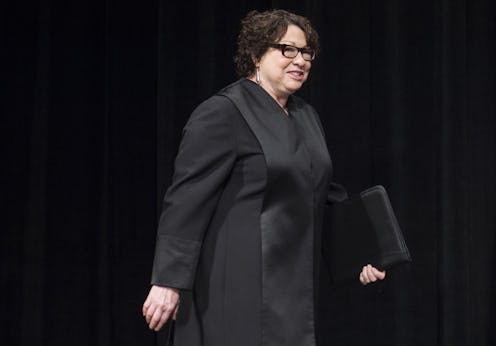News
Even With SCOTUS, Women Are Interrupted More
Even at the highest court in the land, women don't always get their voices heard equally compared to their male counterparts. An analysis released today by Empirical SCOTUS blogger Adam Feldman illustrated how the younger female Supreme Court justices get interrupted at rates disproportionately higher than their male peers do. Not surprisingly, Elena Kagan and Sonia Sotomayor are interrupted the most of the justices who currently serve the highest court in the land. As it almost goes without saying, it’s the men doing most of the interrupting.
This term alone, Sotomayor was interrupted 57 times; Kagan, 50. Then there’s a noticeable drop before we get to third place, which is Justice Stephen Breyer at 36. The rest are reasonably close to that number — except for Clarence Thomas who was, of course, interrupted zero times. (You cannot interrupt a terminally silent person).
Justice Anthony Kennedy was the guy behind a lot of this interrupting (if you don’t closely follow SCOTUS, you might still recognize his name from a touching and widely circulated paragraph he wrote on gay marriage last year). According to Feldman’s data and analysis, he is the justice with the most interruptions of another single justice (Sotomayor, 14 interruptions). He also accounts for almost half of all interruptions of Justice Ruth Bader Ginsburg, whom others seem reluctant to disrupt.
While Kennedy often references male justices, he doesn’t interrupt them with nearly the same frequency as he interrupts female justices. Feldman acknowledged that it’s difficult to know what impact these interruptions may have or why they occur disproportionately to the younger two women. He wondered in the report whether this pattern might be because the two female justices in question are more hesitant and “deferential” to their colleagues. While I’m not above considering the role Kagan and Sotomayor's behavior may play (though there are plenty of loaded reasons why women may be more "deferential" or quiet, especially at work), we’re left with a familiar trope — men, talking over women, all the time.
This sounds familiar not just because women live this stuff every day, but because we’ve been seeing similar things play out in the election cycle. Sanders gets to do that two-finger wave thing that he does and be all, “excuse me, I’m talking,” while Clinton is constantly accused of “shouting.” It’s harder to accuse, say, the notorious RBG of shouting because she's not in nationally-televised or, for that matter, debate situations the vast majority of her professional time; when Clinton speaks at a normal volume — or a volume that wouldn’t raise any eyebrows coming from a man — she is “yelling.”
Earlier this week, when Senate Minority Leader Harry Reid said he would “yell and scream” to stop Clinton from choosing a VP from a state with a Republican governor, no one really made a big deal out of that or implied that it reflected on his character, that he was unfit for his position. I highly doubt that Clinton would have been afforded the same privilege. Men being loud and interrupting women is just seen as the way of things. Ask Justice Kennedy.
